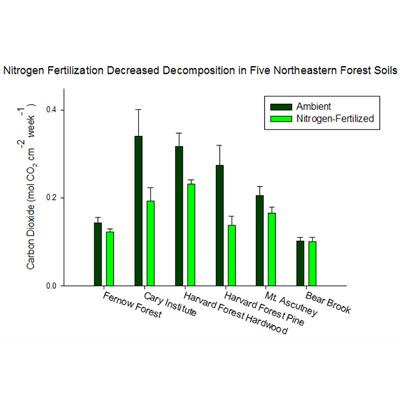The Response of Soil Carbon to Elevated Nitrogen Deposition in Northeastern Forests: New Measurements across Nine Fertilization Experiments

NSRC researchers have found that long-term nitrogen pollution is likely decreasing decomposition in Northern Forest soils. During decomposition, soil organisms consume debris such as fallen leaves. The organisms use energy from the debris for growth and reproduction, and they produce carbon dioxide as a waste.
Researchers showed that when nitrogen was experimentally added to six northeastern forest soils for 15 to 20 years at a rate 3 to 6 times in excess of the current pollution rate, five of the six nitrogen-fertilized soils produced less carbon dioxide than their unfertilized counterparts. Only one forest site did not show any difference in carbon dioxide production between nitrogen fertilized and unfertilized soil.
As a result of long-term nitrogen deposition, soils may accumulate some carbon that would have otherwise ended up in the atmosphere as carbon dioxide. On the other hand, long-term nitrogen pollution may be detrimental to the soil organisms that greatly influence decomposition. Since soil organisms play an important role in maintaining the structure and function of the soil ecosystem, disturbing soil organisms may have serious unforeseen consequences. NSRC researchers continue to assess how much decomposition might decrease with long-term nitrogen pollution and the consequences of nitrogen pollution for soil organisms.
